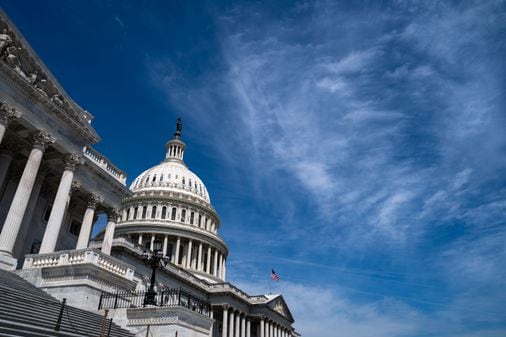Regulation
As Cryptocurrencies Flood Washington, Congress Considers Softer Regulations

On Capitol Hill, the industry has shelled out more than $60 million to shape federal policy since the start of 2021, according to documents analyzed by The Washington Post and data from OpenSecrets and Public Citizen, two government watchdog organizations. money in politics. The lobbying campaign helped push the House on Wednesday to advance the first major cryptocurrency bill to clear either chamber of Congress.
Receive breaking news alerts
Stay on top of important news developments, delivered straight to your inbox.
The bill would move some federal oversight of crypto from the Securities and Exchange Commission, an aggressive regulator, to the Commodity Futures Trading Commission, which some critics view as weaker, more industry-friendly and underfunded. Coinbase, Ripple and advocacy groups including the Blockchain Association and the Crypto Center for Innovation helped House Republicans craft the legislative approach, then aggressively canvassed the Capitol to rally votes in favor of its adoption.
Industry executives, investors and workers — along with their companies’ official political operations — also contributed nearly $90 million to campaigns and other groups over the past two elections, according to the analysis. They supported the architects and advocates of the House bill, including Rep. Patrick T. McHenry, a North Carolina Republican who chairs the House Financial Services Committee. And the industry funded a trio of powerful new super PACs, which flooded the airwaves with TV ads touting friendly candidates from both parties, often without mentioning crypto at all.
Spending estimates are understated, in part because federal campaign finance laws do not require companies and executives to disclose their donations to certain nonprofit groups. Nonetheless, the numbers suggest that the crypto industry now belongs to a category of Beltway powers that routinely shell out massive sums to influence policymaking.
Speaking to reporters a day before House passage, McHenry acknowledged the myriad ways in which cryptocurrency companies are “maturing” in Washington, a dynamic he described as key to crafting the first draft of the bill. major crypto legislation from Congress.
“It’s a benefit for this vote,” McHenry said of raising industry awareness, “and for policymakers to realize it.”
Coinbase declined to make an executive available for an interview. Brad Garlinghouse, chief executive of Ripple, said crypto has stepped up politically to “provide perspective on all things constructive and positive in this industry.”
The Senate has not said whether it plans to consider the bill this year. The White House said last week that it “opposed” the proposal, but did not explicitly threaten to veto it. Other leading federal watchdogs have made more glaring calls in recent days, warning that the House crypto bill could unleash new dangers for the economy.
“The crypto industry’s record of failures, frauds and bankruptcies is not because we don’t have rules or because the rules aren’t clear,” the president said. the SEC, Gary Gensler, in a press release. “That’s because many in the crypto industry don’t play by the rules.”
The rapid rise of the industry in Washington is striking, two years after the catastrophic failure of FTX, a marketplace where people could buy and sell virtual currencies – known as an exchange – that was the third largest platform in the world and was once valued at $32 billion. .
In March, a federal court sentenced the company’s once-omnipresent executive, Sam Bankman-Fried, to 25 years in prison, finding him guilty of numerous crimes stemming from his misuse of customer deposits for risky bets and donations illegal policies. His actions ultimately wiped out FTX, leaving the company bankrupt and customers scrambling for refunds.
After the FTX scandal, many lawmakers sounded the alarm that a broader crypto collapse could jeopardize the economy as a whole. But those warnings only accelerated the political shift already underway in the industry, which has quadrupled the number of registered lobbyists in Washington from 58 in 2020 to more than 270 at the end of last year. according to federal data.
“There needs to be an organized, concerted effort to engage with Washington,” said Kristin Smith, chief executive of the Blockchain Association, which represents many of the largest crypto platforms and investors. She added that “it was very clear during the post-FTX collapse that the crypto industry was in the penalty box.”
On Capitol Hill, the industry was specifically seeking “regulatory clarity,” primarily through legislation that would give oversight responsibilities to the Commodities Trade Commission, a half-century-old agency meant to originally oversee corn and grain futures. Many crypto supporters viewed it as a friendly regulator, at least compared to the SEC, which in recent years has taken 170 enforcement actions against digital currencies and trading platforms, including Binance, Coinbase and Ripple.
In the summer, House Republicans responded with the bill known as FIT21, a highly complex proposal that would allow cryptocurrency companies to be regulated primarily by the CFTC.
The measure would also relax some of the financial disclosures crypto companies must provide to their customers while limiting cases where investors could sue for abuse. Importantly, the bill would provide no new funding for the Commodities Commission, despite its recent calls to Congress for a larger budget. The commission did not respond to a request for comment.
Many cryptocurrency lobbyists and advocates acknowledge having been closely involved in drafting the proposal. Sheila Warren, executive director of the Crypto Council for Innovation, said last week that her group had been “working” on some provisions “a year and a half or two years ago.” The group is backed by Coinbase and investors including Andreessen Horowitz, a major Silicon Valley venture capital firm.
The industry’s proximity to the legislation alarmed consumer watchdogs, which argued the House threatened to create major regulatory loopholes.
Lawmakers nevertheless approved the measure in a bipartisan vote of 279-136 on Wednesday, marking the latest victory for the industry.
Many Democrats said the dynamic was reminiscent of the 2008 financial crisis, when Washington failed to stop the nation’s largest banks from underwriting subprime mortgages. About 6 million people lost their homes in the resulting financial crisis and recession, while the U.S. government spent billions of dollars to pull the country out of the rubble.
“Before the crash of 2008, when I talked about the inadequacy of our oversight of the banks, I kept saying: Everything seems good today, but it will end badly,” Massachusetts Democratic Senator Elizabeth Warren said in a recent interview. “I feel that today. This may seem okay for now, but inviting crypto deeper into our economy without putting adequate regulations in place will end badly.
Cryptocurrency companies strongly resist these comparisons, arguing that members of Congress simply don’t understand this new, rapidly evolving industry. To further solidify their support on Capitol Hill, they have set their sights on this year’s elections. Garlinghouse, the Ripple CEO, cited “Elizabeth Warren’s megaphone” as the reason for the industry’s massive campaign spending.
Regulation
Crypto community gets involved in anti-government protests in Nigeria

Amid the #EndBadGovernanceInNigeria protests in Nigeria, a notable shift is occurring within the country’s cryptocurrency sector. As the general public demands sweeping governance reforms, crypto community leaders are seizing the opportunity to advocate for specific regulatory changes.
Rume Ophi, former secretary of the Blockchain Stakeholders Association of Nigeria (SiBAN), stressed the critical need to integrate crypto-focused demands into the broader agenda of the protests.
Ophi explained the dual benefit of such requirements, noting that proper regulation can spur substantial economic growth by attracting investors and creating job opportunities. Ophi noted, “Including calls for favorable crypto regulations is not just about the crypto community; it’s about leveraging these technologies to foster broader economic prosperity.”
Existing government efforts
In opposition to Ophi’s call for action, Chimezie Chuta, chair of the National Blockchain Policy Steering Committee, presents a different view. He pointed out The Nigerian government continued efforts to nurture the blockchain and cryptocurrency industries.
According to Chuta, the creation of a steering committee was essential to effectively address the needs of the crypto community.
Chuta also highlighted the creation of a subcommittee to harmonize regulations for virtual asset service providers (VASPs). With the aim of streamlining operations and providing clear regulatory direction, the initiative involves cooperation with major organizations including the Securities and Exchange Commission (SEC) and the Central Bank of Nigeria (CBN). “Our efforts should mitigate the need for protest as substantial progress is being made to address the needs of the crypto industry,” Chuta said.
A united call for support
The ongoing dialogue between the crypto community and government agencies reflects a complex landscape of negotiations and demands for progress.
While actors like Ophi are calling for more direct action and the inclusion of crypto demands in protest agendas, government figures like Chuta are advocating for recognition of the steps already taken.
As protests continue, the crypto community’s push for regulatory reform highlights a crucial aspect of Nigeria’s broader fight to improve governance and economic policies. Both sides agree that favorable regulations are critical to the successful adoption and implementation of blockchain technologies, signaling a potentially transformative era for Nigeria’s economic framework.
Read also : OKX Exchange Exits Nigerian Market Amid Regulatory Crackdown
Regulation
Cryptocurrency Regulations in Slovenia 2024

Slovenia, a small but highly developed European country with a population of 2.1 million, boasts a rich industrial history that has contributed greatly to its strong economy. As the most economically developed Slavic nation, Slovenia has grown steadily since adopting the euro in 2007. Its openness to innovation has been a key factor in its success in the industrial sector, making it a prime destination for cryptocurrency enthusiasts. Many believe that Slovenia is poised to become a powerful fintech hub in Europe. But does its current regulatory framework for cryptocurrencies support such aspirations?
Let’s explore Slovenia’s cryptocurrency regulations and see if they can propel the country to the forefront of the cryptocurrency landscape. My expectations are positive. What are yours? Before we answer, let’s dig a little deeper.
1. Cryptocurrency regulation in Slovenia: an overview
Slovenia is renowned for its innovation-friendly stance, providing a supportive environment for emerging technologies such as blockchain and cryptocurrencies. Under the Payment Services and Systems Act, cryptocurrencies are classified as virtual assets rather than financial or monetary instruments.
The regulation of the cryptocurrency sector in Slovenia is decentralized. Different authorities manage different aspects of the ecosystem. For example, the Bank of Slovenia and the Securities Market Agency oversee cryptocurrency transactions to ensure compliance with financial laws, including anti-money laundering (AML) and terrorist financing regulations. The Slovenian Act on the Prevention of Money Laundering and Terrorist Financing (ZPPDFT-2) incorporates the EU’s 5th Anti-Money Laundering Directive (5MLD) and aligns with the latest FATF recommendations. All virtual currency service providers must register with the Office of the Republic of Slovenia.
2. Cryptocurrency regulation in Slovenia: what’s new?
Several notable developments have taken place this year in the cryptocurrency sector in Slovenia:
July 25, 2024:Slovenia has issued a €30 million on-chain digital sovereign bond, the first of its kind in the EU, with a yield of 3.65%, maturing on 25 November 2024.
May 14, 2024:NiceHash has announced the first Slovenian Bitcoin-focused conference, NiceHashX, scheduled for November 8-9 in Maribor.
3. Explanation of the tax framework for cryptocurrencies in Slovenia
The Slovenian cryptocurrency tax framework provides clear guidelines for individuals and businesses. According to the Slovenian Financial Administration, the tax treatment depends on the status of the trader and the nature of the transaction.
- People:Income earned from cryptocurrencies through employment or ongoing business activities is subject to personal income tax. However, capital gains from transactions or market fluctuations are exempt from tax.
- Companies:Capital gains from cryptocurrency-related activities are subject to a 19% corporate tax. Value-added tax (VAT) generally applies at a rate of 22%, although cryptocurrency transactions that are considered as means of payment are exempt from VAT. Companies are not allowed to limit payment methods to cryptocurrencies alone. Tokens issued during ICOs must follow standard accounting rules and corporate tax law.
4. Cryptocurrency Mining in Slovenia: What You Need to Know
Cryptocurrency mining is not restricted in Slovenia, but income from mining is considered business income and is therefore taxable. This includes rewards from validating transactions and any additional income from mining operations. Both individuals and legal entities must comply with Slovenian tax regulations.
5. Timeline of the development of cryptocurrency regulation in Slovenia
Here is a timeline highlighting the evolution of cryptocurrency regulations in Slovenia:
- 2013:The Slovenian Financial Administration has issued guidelines stating that income from cryptocurrency transactions should be taxed.
- 2017:The Slovenian Financial Administration has provided more detailed guidelines on cryptocurrency taxation, depending on factors such as the status of the trader and the type of transaction.
- 2023:The EU adopted the Markets in Crypto-Assets (MiCA) Regulation, establishing a uniform regulatory framework for crypto-assets, their issuers and service providers across the EU.
Endnote
Slovenia’s approach to the cryptocurrency sector is commendable, reflecting its optimistic view of the future of cryptocurrencies. The country’s balanced regulatory framework supports cryptocurrency innovation while protecting users’ rights and preventing illegal activities. Recent developments demonstrate Slovenia’s commitment to continually improving its regulatory environment. Slovenia’s cryptocurrency regulatory framework sets a positive example for other nations navigating the evolving cryptocurrency landscape.
Read also : Hong Kong Cryptocurrency Regulations 2024
Regulation
A Blank Sheet for Cryptocurrencies: Kamala Harris’ Regulatory Opportunity

photo by Shubham Dhage on Unsplash
As the cryptocurrency landscape continues to evolve, the need for clear regulation has never been more pressing.
With Vice President Kamala Harris now leading the charge on digital asset regulation in the United States, this represents a unique opportunity to start fresh. This fresh start can foster innovation and protect consumers. It can also pave the way for widespread adoption across industries, including real estate agencies, healthcare providers, and online gaming platforms like these. online casinos ukAccording to experts at SafestCasinoSites, these platforms come with benefits such as bonus offers, a wide selection of games, and various payment methods. Ultimately, all this increase in adoption could propel the cryptocurrency market forward.
With this in mind, let’s look at the current state of cryptocurrency regulation in the United States, a complex and confusing landscape. Multiple agencies, including the Securities and Exchange Commission (SEC), the Commodity Futures Trading Commission (CFTC), and the Financial Crimes Enforcement Network (FinCEN), have overlapping jurisdictions, creating a fragmented regulatory environment. This lack of clarity has stifled innovation as companies are reluctant to invest in the United States, fearing regulatory repercussions. A coherent and clear regulatory framework is urgently needed to realize the full potential of cryptocurrencies in the United States.
While the US struggles to find its footing, other countries, such as Singapore and the UK, are actively looking into the cryptocurrency sector by adopting clear and supportive regulatory frameworks. This has led to a brain drain, with companies choosing to locate in more conducive environments.
Vice President Kamala Harris has a unique opportunity to change that narrative and start over. Regulation of cryptocurrencies. By taking a comprehensive and inclusive approach, it can help create a framework that balances consumer protection with innovation and growth. The time has come for clear and effective regulation of cryptocurrencies in the United States.
Effective regulation of digital assets is essential to foster a safe and innovative environment. The key principles guiding this regulation are clarity, innovation, global cooperation, consumer protection, and flexibility. Clear definitions and guidelines eliminate ambiguity while encouraging experimentation and development to ensure progress. Collaboration with international partners establishes consistent standards, preventing regulatory arbitrage. Strong safeguards protect consumers from fraud and market abuse, and adaptability allows for evolution in response to emerging trends and technologies, striking a balance between innovation and protection.
The benefits of effective cryptocurrency regulation are multiple and far-reaching. By establishing clear guidelines, governments can attract investors and mainstream users, driving growth and adoption. This can, in turn, position countries like the United States as global leaders in fintech and innovation. Strong safeguards will also increase consumer confidence in digital assets and related products, increasing economic activity.
A thriving crypto industry can contribute significantly to GDP and job creation, which has a positive impact on the overall economy. Furthermore, effective regulation has paved the way for the growth of many businesses such as tech startups, online casinos, and pharmaceutical companies, demonstrating that clear guidelines can open up new opportunities without stifling innovation. This is a great example of how regulation can allay fears of regressive policies, even if Kamala Harris does not repeal the current progressive approach. By adopting effective regulation, governments can create fertile ground for the crypto industry to thrive, thereby promoting progress and prosperity.
Regulation
South Korea Imposes New ‘Monitoring’ Fees on Cryptocurrency Exchanges

Big news! The latest regulatory changes in South Korea are expected to impact major cryptocurrency exchanges like Upbit and Bithumb. Under the updated regulations, these platforms will now have to pay monitoring fees, which could cause problems for some exchanges.
Overview of new fees
In the latest move to regulate cryptocurrencies, the Financial Services Commission announced on July 1 the revised “Enforcement Order of the Act on the Establishment of the Financial Services Commission, etc.” update “Regulations on the collection of contributions from financial institutions, etc.” According to local legislation newsThe regulations require virtual asset operators to pay supervisory fees for inspections conducted by the Financial Supervisory Service starting next year. The total fees for the four major exchanges are estimated at around 300 million won, or about $220,000.
Apportionment of costs
Upbit, which holds a dominant market share, is expected to bear more than 90% of the total fee, or about 272 million won ($199,592) based on its operating revenue. Bithumb will pay about 21.14 million won ($155,157), while Coinone and GOPAX will contribute about 6.03 million won ($4,422) and 830,000 won ($608), respectively. Korbit is excluded from this fee due to its lower operating revenue.
Impact on the industry
The supervision fee will function similarly to a quasi-tax for financial institutions subject to inspections by the Financial Supervisory Service. The new law requires any company with a turnover of 3 billion won or more to pay the fee.
In the past, fees for electronic financial companies and P2P investment firms were phased in over three years. However, the taxation of virtual asset operators has been accelerated, reflecting the rapid growth of the cryptocurrency market and increasing regulatory scrutiny.
Industry reactions
The rapid introduction of the fee was unexpected by some industry players, who had expected a delay. Financial Supervisory Service officials justified the decision by citing the creation of the body concerned and the costs already incurred.
While larger exchanges like Upbit and Bithumb can afford the cost, smaller exchanges like Coinone and GOPAX, which are currently operating at a loss, could face an additional financial burden. This is part of a broader trend of declining trading volumes for South Korean exchanges, which have seen a 30% drop since the new law went into effect.
-

 Regulation12 months ago
Regulation12 months agoRipple CTO and Cardano founder clash over XRP’s regulatory challenges ⋆ ZyCrypto
-

 Regulation10 months ago
Regulation10 months agoNancy Pelosi Considers Supporting Republican Crypto Bill FIT21 – London Business News
-

 Videos11 months ago
Videos11 months agoCryptocurrency News: Bitcoin, ETH ETF, AI Crypto Rally, AKT, TON & MORE!!
-

 Regulation11 months ago
Regulation11 months agoBitcoin’s future is ‘bleak’ and ripe for regulation, says lead developer
-

 News9 months ago
News9 months agoAave Price Increases Following Whales Accumulation and V3.1 Launch
-

 Regulation9 months ago
Regulation9 months agoSouth Korea Imposes New ‘Monitoring’ Fees on Cryptocurrency Exchanges
-

 Regulation9 months ago
Regulation9 months agoA Blank Sheet for Cryptocurrencies: Kamala Harris’ Regulatory Opportunity
-

 Regulation9 months ago
Regulation9 months agoCryptocurrency Regulations in Slovenia 2024
-

 News11 months ago
News11 months agoThe trader earned $46 million with PEPE after reaching a new ATH
-

 Regulation11 months ago
Regulation11 months agoCrypto needs regulation to thrive: Tyler Cowen
-

 Blockchain11 months ago
Blockchain11 months agoSolana ranks the fastest blockchain in the world, surpassing Ethereum, Polygon ⋆ ZyCrypto
-

 Blockchain11 months ago
Blockchain11 months agoSolana Surpasses Ethereum and Polygon as the Fastest Blockchain ⋆ ZyCrypto

















